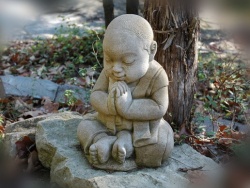Difference between revisions of "30 nissaggiya pacittiya (confession with forfeiture)"
| Line 3: | Line 3: | ||
[[30 nissaggiya pacittiya]] ([[confession with forfeiture]]): | [[30 nissaggiya pacittiya]] ([[confession with forfeiture]]): | ||
| − | 30 [[nissaggiya pacittiya]] are rules entailing "{{Wiki|confession}} with forfeiture." They are mostly concerned with the possessing of items which are disallowed or obtained in disallowable ways. The [[monk]] has to forfeit the item and then confess his offense to another [[monk]]. The [[thirty nissaggiya pacittiya]] for [[bhikku]] are: | + | 30 [[nissaggiya pacittiya]] are {{Wiki|rules}} entailing "{{Wiki|confession}} with forfeiture." They are mostly concerned with the possessing of items which are disallowed or obtained in disallowable ways. The [[monk]] has to forfeit the item and then confess his offense to another [[monk]]. The [[thirty nissaggiya pacittiya]] for [[bhikku]] are: |
1. Keeping an extra robe for more than ten days after receiving a new one. | 1. Keeping an extra robe for more than ten days after receiving a new one. | ||
| Line 16: | Line 16: | ||
5. Accepting [[robes]] from a [[bhikkuni]] as a [[gift]]. | 5. Accepting [[robes]] from a [[bhikkuni]] as a [[gift]]. | ||
| − | 6. Accepting [[robes]] from the laity, except when one's own [[robes]] have been destroyed, or one is | + | 6. Accepting [[robes]] from the laity, except when one's [[own]] [[robes]] have been destroyed, or one is |
| − | asking for the sake of another [[bhikku]]. | + | asking for the [[sake]] of another [[bhikku]]. |
| − | 7. Accepting too many [[robes]] from the laity when one's own [[robes]] have been destroyed. | + | 7. Accepting too many [[robes]] from the laity when one's [[own]] [[robes]] have been destroyed. |
8. Accepting a robe from a lay [[person]] after telling them that their robe is too cheap for you. | 8. Accepting a robe from a lay [[person]] after telling them that their robe is too cheap for you. | ||
| Line 26: | Line 26: | ||
to buy a nicer robe. | to buy a nicer robe. | ||
| − | 10. Accepting a robe after coming to the treasurer to get the robe more than six times (since this | + | 10. Accepting a robe after coming to the treasurer to get the robe more than [[six times]] (since this |
indicates an excess of [[desire]]). | indicates an excess of [[desire]]). | ||
| Line 39: | Line 39: | ||
15. Making or accepting a sitting rug without incorporating at least one old piece of felt 25 cm. | 15. Making or accepting a sitting rug without incorporating at least one old piece of felt 25 cm. | ||
| − | square, for the sake of discoloring it. | + | square, for the [[sake]] of discoloring it. |
16. Carrying raw wool for more than 48 km. | 16. Carrying raw wool for more than 48 km. | ||
| Line 46: | Line 46: | ||
18. Accepting {{Wiki|gold}} or [[money]], or telling someone how to donate it. If [[money]] is placed in a | 18. Accepting {{Wiki|gold}} or [[money]], or telling someone how to donate it. If [[money]] is placed in a | ||
| − | bhikku's presence he may not [[recognize]] it as his nor tell someone else to take care of it | + | bhikku's presence he may not [[recognize]] it as his nor tell someone else to take [[care]] of it |
| − | for him. [[Bhikkus]] often have stewards who will take care of {{Wiki|donations}}, but the stewards are always free to take the [[money]] and leave. | + | for him. [[Bhikkus]] often have stewards who will take [[care]] of {{Wiki|donations}}, but the stewards are always free to take the [[money]] and leave. |
19. Buying or selling goods. | 19. Buying or selling goods. | ||
| Line 66: | Line 66: | ||
26. Getting thread, and getting [[people]] to weave thread for you. | 26. Getting thread, and getting [[people]] to weave thread for you. | ||
| − | 27. Receiving cloth after telling its weavers to increase the quality for you. | + | 27. Receiving cloth after telling its weavers [[to increase]] the [[quality]] for you. |
| − | 28. Keeping [[robes]] past the end of the season after accepting them during the last eleven days of | + | 28. Keeping [[robes]] {{Wiki|past}} the end of the season after accepting them during the last eleven days of |
the [[Rains Retreat]], ([[Vassa]]). | the [[Rains Retreat]], ([[Vassa]]). | ||
| Line 74: | Line 74: | ||
distant village and need to separate yourself from your [[robes]] after the [[Rains Retreat]]. | distant village and need to separate yourself from your [[robes]] after the [[Rains Retreat]]. | ||
| − | 30. Persuading a donor to give gifts to oneself, when they were previously intended for the | + | 30. Persuading a {{Wiki|donor}} to give gifts to oneself, when they were previously intended for the |
[[sangha]] at large. | [[sangha]] at large. | ||
| Line 82: | Line 82: | ||
[http://www.dhammawiki.com/index.php?title=30_nissaggiya_pacittiya_%28confession_with_forfeiture%29 www.dhammawiki.com] | [http://www.dhammawiki.com/index.php?title=30_nissaggiya_pacittiya_%28confession_with_forfeiture%29 www.dhammawiki.com] | ||
[[Category:Vinaya Pitaka]]{{BuddhismbyNumber}} | [[Category:Vinaya Pitaka]]{{BuddhismbyNumber}} | ||
| + | [[Category:Bhikkhuni precepts]] | ||
Revision as of 15:28, 8 March 2016
30 nissaggiya pacittiya (confession with forfeiture):
30 nissaggiya pacittiya are rules entailing "confession with forfeiture." They are mostly concerned with the possessing of items which are disallowed or obtained in disallowable ways. The monk has to forfeit the item and then confess his offense to another monk. The thirty nissaggiya pacittiya for bhikku are:
1. Keeping an extra robe for more than ten days after receiving a new one.
2. Sleeping in a separate place from any of his three robes.
3. Keeping an out-of-season robe for more than thirty days when one has expectation for a new
robe.
4. Getting an unrelated bhikkuni to wash your robes for you.
5. Accepting robes from a bhikkuni as a gift.
6. Accepting robes from the laity, except when one's own robes have been destroyed, or one is
asking for the sake of another bhikku.
7. Accepting too many robes from the laity when one's own robes have been destroyed.
8. Accepting a robe from a lay person after telling them that their robe is too cheap for you.
9. Accepting a robe from the laity after asking two or more of them to pool their funds in order
to buy a nicer robe.
10. Accepting a robe after coming to the treasurer to get the robe more than six times (since this
indicates an excess of desire).
11. Owning a blanket or rug made of silk.
12. Making or accepting a blanket or rug made from pure black wool.
13. Making or accepting a blanket or rug made from more than 50% black wool.
14. Making or accepting a blanket or rug fewer than six years after you last made or accepted
one.
15. Making or accepting a sitting rug without incorporating at least one old piece of felt 25 cm.
square, for the sake of discoloring it.
16. Carrying raw wool for more than 48 km.
17. Getting a bhikkuni to wash, dye, or card raw wool.
18. Accepting gold or money, or telling someone how to donate it. If money is placed in a
bhikku's presence he may not recognize it as his nor tell someone else to take care of it
for him. Bhikkus often have stewards who will take care of donations, but the stewards are always free to take the money and leave.
19. Buying or selling goods.
20. Trading goods with anyone besides other bhikkus.
21. Keeping an extra alms bowl for more than ten days after receiving a new one.
22. Asking for a new bowl when your old bowl is not beyond repair.
23. Taking a medicine from storage for more than seven days.
24. Using a rains-bathing cloth before the last two weeks of the fourth month of the hot season,
or accepting one before the fourth month.
25. Taking back a loaned robe out of anger.
26. Getting thread, and getting people to weave thread for you.
27. Receiving cloth after telling its weavers to increase the quality for you.
28. Keeping robes past the end of the season after accepting them during the last eleven days of
the Rains Retreat, (Vassa).
29. Being separated from your robes for more than six nights if you are living in a dangerously
distant village and need to separate yourself from your robes after the Rains Retreat.
30. Persuading a donor to give gifts to oneself, when they were previously intended for the
sangha at large.
(from the Vinaya Pitaka)




